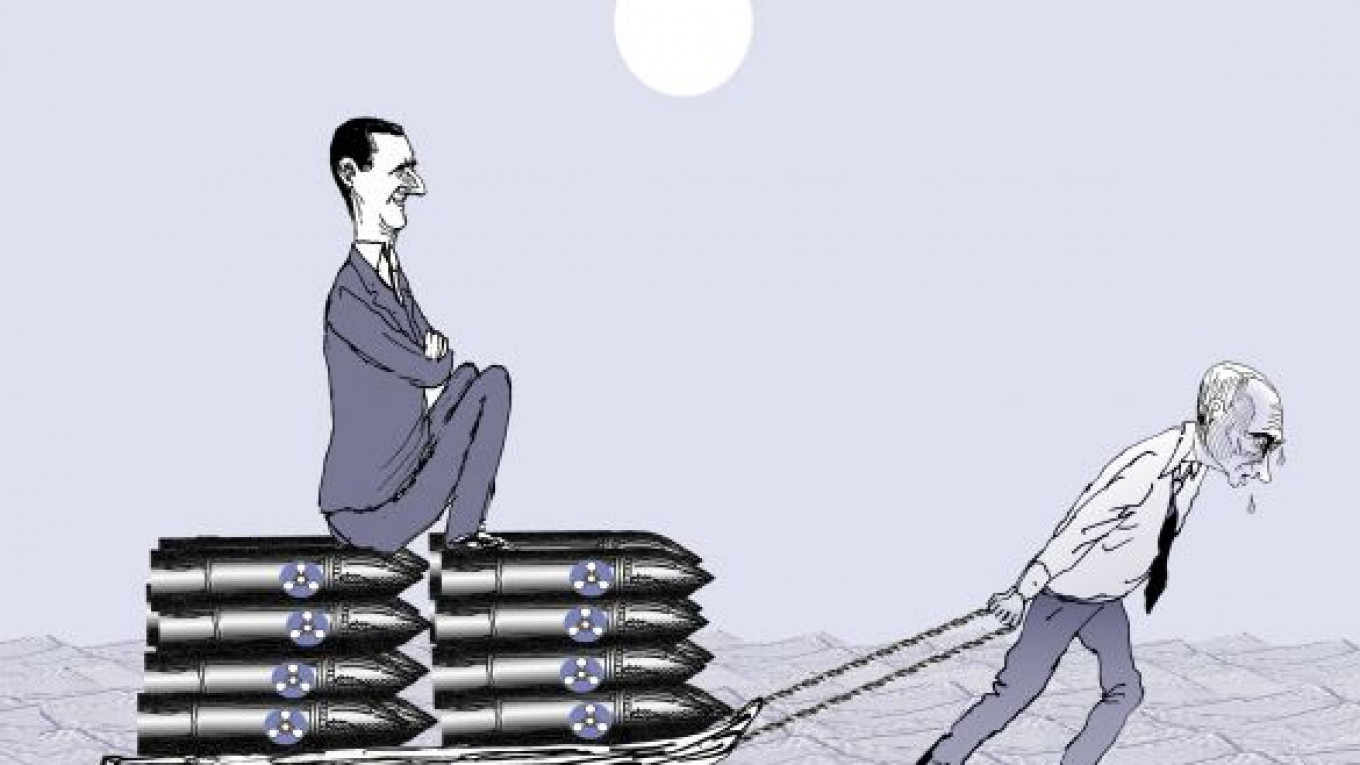Russia scored a brilliant diplomatic victory in Geneva over the weekend. Foreign Minister Sergei Lavrov signed an agreement with U.S. Secretary of State John Kerry that at least postpones any U.S. military operations in Syria for an indefinite period.
According to the agreement, Syria, which has already applied for admission to the Organization for the Prohibition of Chemical Weapons, has one week to submit comprehensive data on the size of its chemical weapons stockpiles and their locations. All equipment for the production of chemical weapons must be destroyed by November, and all of the weapons themselves must be either destroyed or removed from Syrian territory in the first half of 2014.
Even in the best of circumstances, if the chemical weapons agreement is carried out, Russia's Syria problems are far from over.
I have written before about the all-but-forgotten proposal from U.S. Senator Richard Lugar, who lobbied Moscow and Washington to establish joint control over Syria's chemical weapons. Lavrov finally embraced this idea but only after Russia found itself sitting on the sidelines of global politics. President Vladimir Putin's obsession with the threat of a "U.S.-financed color revolution" in Russia and his paranoid belief that all of the regime's troubles are because of Western interference reduced the U.S.-Russian dialogue to a tired list of Kremlin complaints. These included everything from senseless accusations that the West was trying to achieve military superiority over Russia to complaints that Moscow was being forced out of its sphere of influence in the Commonwealth of Independent States.
At some point, Washington decided that it had heard enough and announced it was taking a timeout from the Kremlin. That move was disastrous for Moscow. Since Russia's foreign policy revolves so much around criticizing U.S. policy, when that object of scorn walked away from the dialogue, Russia found itself with nobody to talk to and nothing to say.
But now the Kremlin has triumphed by saving Syrian President Bashar Assad from missile attacks and U.S. President Barack Obama from getting mired in a senseless and futile war. But a closer look at the agreement reveals several significant problems.
The text of the agreement clearly indicates that the "international control" over Syria's chemical weapons will exist on paper only. The document obligates the Assad regime to provide international experts with access to all facilities. This means that the Syrian authorities will continue to have control over the chemical agents up until the moment that they are destroyed or removed. In effect, the international community will be drawn into an endless game of hide-and-seek. Since all decisions must be made through the United Nations Security Council, where Russia holds veto power, it will be impossible to punish the Assad regime for violations of the agreement. What's more, the process of assuming control of the weapons has been assigned to the Organization for the Prohibition of Chemical Weapons, an agency lacking the necessary powers to carry out the task.
In fact, the only way to exercise real control over Syria's chemical weapons would be to deploy international forces to each of the several dozen bases where they are stored, a task requiring up to 70,000 soldiers. But nobody wants to put their soldiers at risk, which makes the whole concept of controlling the chemical weapons a sham.
Even more uncertainties arise concerning the destruction of the chemical weapons. The text of the agreement states it would be preferable to remove the chemical agents from Syrian territory "if that proves feasible." The proposed relocation of chemical weapons would be unprecedented for its scale and risk involved.
Both Russia and the U.S. preferred disposing of their own chemical weapons by taking the extremely expensive step of building facilities for that purpose in close proximity to the stockpiles rather than to risk transporting dangerous substances across the country. The task of transporting 1,000 tons of chemical weapons throughout Syria amid a civil war will be daunting, if not impossible.
Only a few countries began destroying their stockpiles after the Convention on the Prohibition of Chemical Weapons came into force. In Europe, only Russia and Belgium are still destroying their chemical weapons that date back to both world wars. Belgium, with the capacity to destroy only 1,500 weapons per year, is clearly in no position to decommission 1,000 tons of chemical agents coming from Syria. But thanks to the brilliant diplomacy of Lavrov and Putin, thousands of tons of sarin and mustard gas might be heading for a trip across Russia to special facilities in the Bryansk, Kirov or Penza regions.
Another option is to destroy the chemical weapons in Syria, but past experience gives little hope for success. Libya announced in 2004 that it held 50 tons of mustard gas and was willing to destroy it. After lengthy negotiations, facilities were built, mostly at Washington's expense, but only half of the stockpile had been eliminated by 2010 when civil war broke out and the process was halted. The new government now has its hands full just fending off the various armed groups attempting to seize the chemical weapons sites.
Lavrov's achievement will probably be considered a victory only until the actual implementation of the agreement begins. The deal gives the Assad regime a reprieve, but the Syrian authorities will likely violate the agreement. And if the Assad regime commits more atrocities, the global community will hold Russia responsible as well. In either case, Moscow will try to cover for Damascus in the UN Security Council, but that will only make the Kremlin's reputation even worse. Even in the best of circumstances, if the disarmament agreement is actually carried out, Russia will probably have to destroy those chemical weapons on its own territory, and that means needlessly endangering millions of Russians.
Alexander Golts is deputy editor of the online newspaper Yezhednevny Zhurnal.
A Message from The Moscow Times:
Dear readers,
We are facing unprecedented challenges. Russia's Prosecutor General's Office has designated The Moscow Times as an "undesirable" organization, criminalizing our work and putting our staff at risk of prosecution. This follows our earlier unjust labeling as a "foreign agent."
These actions are direct attempts to silence independent journalism in Russia. The authorities claim our work "discredits the decisions of the Russian leadership." We see things differently: we strive to provide accurate, unbiased reporting on Russia.
We, the journalists of The Moscow Times, refuse to be silenced. But to continue our work, we need your help.
Your support, no matter how small, makes a world of difference. If you can, please support us monthly starting from just $2. It's quick to set up, and every contribution makes a significant impact.
By supporting The Moscow Times, you're defending open, independent journalism in the face of repression. Thank you for standing with us.
Remind me later.







